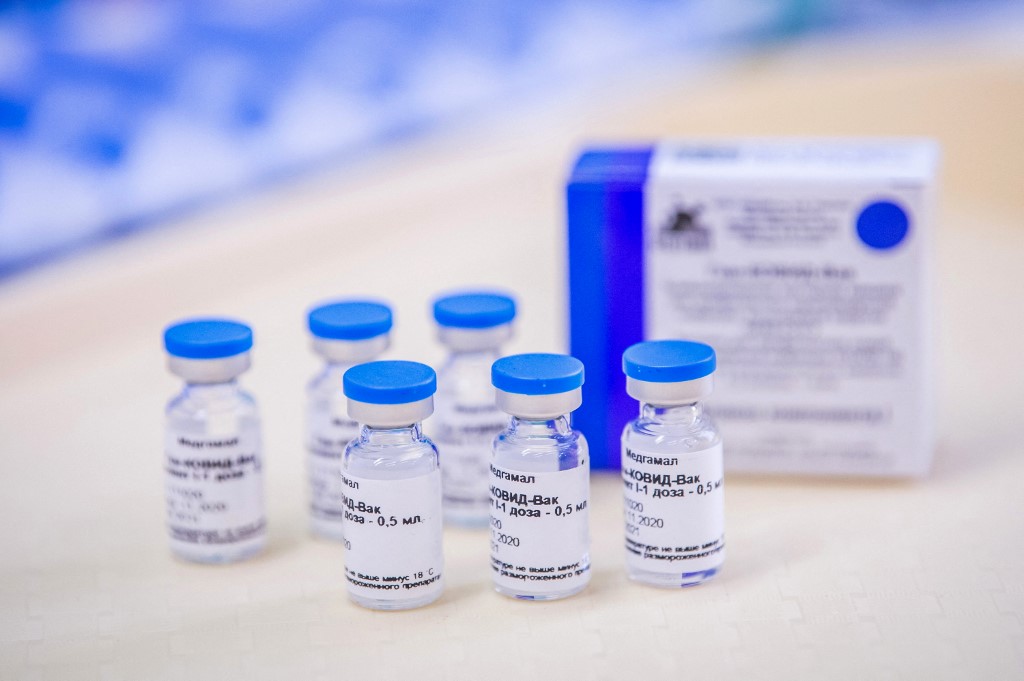
by Danny KEMP
THE HAGUE, Netherlands (AFP) — Europe’s drug regulator launched a rolling review of Russia’s Sputnik V coronavirus vaccine on Thursday, putting it on course to be the first non-Western jab used across the 27-nation EU.
Russia quickly said it was ready to provide jabs for 50 million Europeans as soon as the shot gets the green light from the Amsterdam-based European Medicines Agency (EMA).
Moscow has pushed Europe to follow the lead of dozens of countries around the world that have approved Sputnik, but Brussels has been wary the Kremlin will use the vaccine as a soft-power tool.
“EMA has started a rolling review of Sputnik V, a Covid-19 vaccine developed by Russia’s Gamaleya National Centre of Epidemiology and Microbiology,” the EMA said in a statement.
Sputnik can only apply for formal authorization when “enough evidence is available”, it said, adding that it would “assess Sputnik V’s compliance with the usual EU standards for effectiveness, safety and quality.”
The EU has so far authorized three vaccines: the US-German Pfizer/BioNTech jab, US firm Moderna’s shot, and the British-Swedish AstraZeneca/Oxford vaccine.
It is set to decide on the one-shot Johnson & Johnson vaccine on March 11, while jabs by Novavax and CureVac are also under rolling review.
‘Major step’
The EMA’s announcement came as Brussels faces criticism for a slow start to its mass vaccination rollout after it was held back by supply problems.
Russia and the EMA have sparred in recent weeks over what the developers allege are delays in starting the rolling review.
Sputnik’s developers said Thursday it was a “major step for (the) vaccine’s approval for use in the EU.”
“Following EMA approval, we would be able to provide vaccines for 50 million Europeans starting from June 2021,” Kirill Dmitriyev, the head of the Russian Direct Investment Fund (RDIF), which developed Sputnik, said in a statement.
Several EU member states including Germany and Spain have said recently they would be interested in Sputnik V if it was approved, while Hungary registered it on its own.
However the European Commission said it had no plans yet to include Sputnik in the vaccines it has made deals to buy.
“Currently, no talks are ongoing to integrate the Sputnik vaccine in the portfolio,” a commission spokesman told a daily briefing in Brussels.
Concerns were initially raised about Sputnik after a fast-track procedure that saw it approved for use in Russia last August and deployed in December ahead of large-scale clinical trials.
Fast-track procedure
The EU has also been cautious of using vaccines that could give Moscow or Beijing geopolitical influence.
European Commission chief Ursula von der Leyen said in February that she wondered why Moscow was so keen to offer millions of doses to the EU “while not sufficiently progressing in vaccinating their own people”.
But pressure has grown since the Lancet medical journal published results in February showing Sputnik V to be 91.6 percent effective.
The RDIF, which helped finance the development of Sputnik V, said Thursday that 42 countries have registered the vaccine.
President Vladimir Putin meanwhile said Thursday that Russia had vaccinated two million people with Sputnik.
A decision on possible approval for Sputnik should “take less time than normal” due to work already done during the rolling review, the EMA said.
It has taken between two and four months for other Covid vaccines to move from rolling review to EU authorisation.
One further hurdle could be the insistence of EU officials that Sputnik production sites outside the bloc would need to be inspected.
Sputnik’s developers said on Twitter that “we look forward to welcoming EMA inspectors at the Sputnik V facilities”.
© Agence France-Presse








